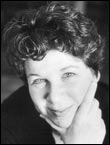
introducing readers to writers since 1995
March 01, 2005
Guest Author: Meg Wolitzer
by Ron Hogan It doesn't really surprise me that Meg Wolitzer (who's described her new novel, The Position, so perfectly in her opening remarks that I'm not even going to try to top her) is a fan of "chick lit." She's just one of the many readers who have noticed in recent years that some of contemporary fiction's deftest social observations are tucked away in (mostly) romantic comedies passed off as mere entertainment. (And for anybody thinking that tying social critique to generic plots is a weak technique strictly for "feminine" genres, your local bookstore has shelves and shelves of private eye novels for your enjoyment.) You've seen a few writers that fall into Wolitzer's "Pink Ladies" category in this blog before, and you'll see plenty of them in the future as well, and Wolitzer can tell you why.
It doesn't really surprise me that Meg Wolitzer (who's described her new novel, The Position, so perfectly in her opening remarks that I'm not even going to try to top her) is a fan of "chick lit." She's just one of the many readers who have noticed in recent years that some of contemporary fiction's deftest social observations are tucked away in (mostly) romantic comedies passed off as mere entertainment. (And for anybody thinking that tying social critique to generic plots is a weak technique strictly for "feminine" genres, your local bookstore has shelves and shelves of private eye novels for your enjoyment.) You've seen a few writers that fall into Wolitzer's "Pink Ladies" category in this blog before, and you'll see plenty of them in the future as well, and Wolitzer can tell you why.
In Praise of Pink Ladies
by Meg Wolitzer
I've done many things in my life that I'm ashamed of. Mostly, these are not things that other people would be ashamed of, but I've got an exceedingly low shame threshold. In fact, I just published a novel about the children of two parents who, in the 1970's, write a Joy of Sex-type of book that features illustrations of themselves making love; my novel deals with the ensuing shame and discomfort that haunt the grown-up children as they try to lead their own lives.But the shame I want to write about here isn't sexual. It isn't graphic in any way, and yet I feel a deep unease. For I am a secret lover of chick lit. I know, I'm supposed to curl my mouth into a sneer whenever the term "chick lit" is mentioned. After all, I'm a so-called "literary" novelist, and like all such novelists I'm routinely asked to list my favorite books or influences. The names "Virginia Woolf" and "Thomas Mann" tend to spring to my lips. These are not lies; I love these writers. Yet those "other" writers--those fluffier, sunnier, pinker ones—are my guilty pleasure. Though all of them are marginally different from each other, their book covers are often pink of hue. For the sake of expedience, I will herein refer to them as the Pink Ladies.
Why do I love the Pink Ladies so? I ought to say here that I don't love all Pink Ladies. I have a distinct preference for the British ones. I am a true sucker for British terminology of all kinds. Just say "in hospital" or "snog" or "why don't you pop round at ten?" and I'm hooked. Bridget Jones, the first of this ilk, was intelligent and funny and appealing. Many readers saw themselves in the eponymous heroine, relating to her singlehood, her tedious office job, her slightly self-deprecating manner, her extra weight. By the time I read that book, though, I was married with children--one of the "smug marrieds"--and there was no way that I related to Bridget. But the book charmed me; it was witty, a crisp literary apple sorbet between courses comprised of, well, Virginia Woolf and Thomas Mann, two writers whose "fluff" factor is so low as to be non-existent.After Bridget I branched out, reading the Irish writer Marian Keyes and then Sophie Kinsella (whose Shopaholic novels are surprisingly funny) and a couple of the others whose names, to tell the truth, I never quite remember. Many of these novels are entirely disposable. They can be read between things, they don't require great thought, and they don't "move" you. But the writers are open and earnest and rely on wit. They don't try anything experimental or sensational. Each time you pick up one of the Pink Ladies, you know what you're going to get: a wisecracking protagonist or narrator with a bunch of faithful friends, a dull, obviously-all-wrong man and then, in the wings, an ironic, slightly rumpled, appealing but seemingly unattainable man. Until the end, when the attainable is attained.
The Pink Ladies are completely apolitical. Yet beneath their manicured, high-gloss surfaces is a depiction of a certain kind of urban female life at this point in time. If these books were placed in a time capsule and opened up at a much later date, people would get to see what these post-post-post-feminist women were like. They'd see how sexual freedom played a big part in their lives, as big a part as, say, finding the right handbag or the right man to marry. Marriage certainly has a big role in these books, but it isn't contradictory to autonomy. In fact, autonomy here is about choosing the right man, and not settling for the dullish Lord or Viscount or advertising executive waiting in the wings. It's not groundbreaking or powerful, but it speaks to many women, even, weirdly, a woman like me, a long-married feminist and novelist. Chick lit is a damning term, one that brings to mind tight skirts and empty heads. But there's an irony and self-awareness at work in some of these books, hiding inside a blaze of pink.
photo: Deborah Copaken Kogan
your PayPal donation
can contribute towards its ongoing publication.